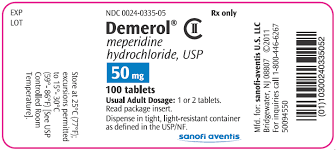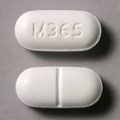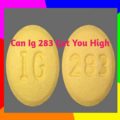Is Demerol An Opioid [Meperidine Hydrochloride]
Demerol [Meperidine Hydrochloride] is the brand name for Pethidine a synthetic opioid pain medication of the phenylpiperidine class. It was first Synthesized in 1939 as a potential anticholinergic agent by the German chemist Otto Eisleb, its analgesic properties were first recognized by Otto Schaumann while working for IG Farben, Germany. Demerol [Meperidine Hydrochloride] works in the brain by changing how your body feels and responds to pain. As Demerol is a potent opioid narcotic, it is seldom prescribed in an outpatient setting; most individuals will receive Demerol while on hospital admission.
What is Demerol [Meperidine Hydrochloride] Used For?
Pethidine or Demerol [Meperidine Hydrochloride] is used for the treatment of moderate to severe pain, it was the opioid of choice for many physicians for much of the 20th century and by 1975, 60% of doctors prescribed it for acute pain and 22% for chronic severe pain. Compared with morphine, Meperidine Hydrochloride was thought to be safer and carry a lower risk of addiction.
What Are The Side Effects Of Demerol [Meperidine Hydrochloride]?
Many people using Demerol [Meperidine Hydrochloride] do not have serious side effects. Call your doctor or seek emergency medical assistance if you have any of these serious side effects:
Weak or shallow breathing, slow heartbeat
Severe drowsiness, feeling like you might pass out
Seizure (convulsions)
Cold, clammy skin
Muscle movements you cannot control
Confusion, mood changes
Severe weakness or dizziness
Agitation, hallucinations, fever, fast heart rate, overactive reflexes, nausea, vomiting, diarrhea, loss of coordination, fainting
Less serious side effects of Demerol [Meperidine Hydrochloride]
Constipation
Loss of appetite
Headache, dizziness, mild weakness
Dry mouth
Sweating
Itching
Urinating less than usual
Loss of interest in sex.
Demerol [Meperidine Hydrochloride] Abuse and Addiction
Meperidine can be habit-forming and should be used only by the person for which it was prescribed for. Keep the medication in a secure place where others cannot get to it. Demerol functions by altering the body’s perception of pain by working on the central nervous system of the body. In addition to the powerful analgesic properties of Demerol, the narcotic also produces feelings of pleasure and giddiness, which can lead many individuals to use this narcotic for nonmedical reasons. When you take Demerol [Meperidine Hydrochloride] in higher doses, or for longer periods than recommended by your doctor, or you could have serious or life-threatening side effects. Overdose symptoms may include extreme drowsiness, muscle weakness, confusion, cold and clammy skin, pinpoint pupils, shallow breathing, slow heart rate, fainting, or coma.
Effects of Demerol [Meperidine Hydrochloride] Abuse
For those who abuse Demerol [Meperidine Hydrochloride], side effects may be severe. Abusing prescription opioids can put people at higher risk of developing the following issues:
- Physical and psychological dependence.
- HIV, hepatitis, and other infectious diseases (if sharing needles).
- Permanent brain damage due to hypoxia (insufficient oxygen to the brain).
- Potentially fatal respiratory depression.
Demerol [Meperidine Hydrochloride] Withdrawal Symptoms
Do not stop using meperidine suddenly, or you could have unpleasant withdrawal symptoms. Ask your doctor how to avoid withdrawal symptoms in larger amounts, do not drink alcohol while you are taking meperidine. This medication may impair your thinking or reactions. Avoid driving or operating machinery until you know how your body will react to meperidine. Demerol withdrawal include symptoms:
- Involuntary leg movements.
- Cold flashes.
- Runny nose.
- Dilated pupils.
- Dilated pupils.
- Gastrointestinal distress (nausea, vomiting, diarrhea
CLICK HERE TO DOWNLOAD How to Overcome Addiction PDF


![What is Demerol [Meperidine Hydrochloride]](http://www.publichealth.com.ng/wp-content/uploads/2018/06/Demerol-Meperidine-Hydrochloride.jpeg)



